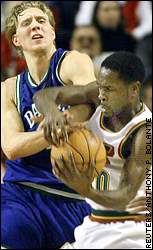|
|
|
Wednesday, November 29, 2000
Sonics: Ewing, Mason just need more time
ESPN.com
|
For every NBA team that is on a roll, there is a team that isn't. That's why we need the doctor -- Dr. Jack Ramsay. Each week in Dr. Jack's Prescription, the Hall of Fame coach will analyze a team in distress, and offer a cure to what ails them.
This week: Seattle SuperSonics
|  | | Gary Payton is playing good ball, but the team has yet to get hot. |
The Symptoms
Seattle made offseason changes with hopes of moving to contending status in
the tough Western Conference after last season's 47-35 finish. The
acquisition of Patrick Ewing presumably gave the Sonics their first
legitimate center since Jack Sikma in the late-'70s. General Manager Wally
Walker and coach Paul Westphal were also excited about first round draft pick
Desmond Mason -- a lean, 6-7 shooting guard from Oklahoma, who lit up summer
league competition. Gary Payton and Vin Baker, fresh from Olympic success,
appeared geared up for banner seasons; and Rashard Lewis seemed ready for an
expanded role in only his third year out of high school.
But the Sonics have failed to boom. Only Payton (25 ppg, 9 apg, 5 rpg) and
Lewis (18 ppg, 6.5 rpg) are playing at expected levels. Ewing has struggled
-- especially on offense, where he's shooting only 38 percent from the field and 68 percent
from the line -- career lows for him in both categories. Mason, thrust into
the starting lineup, shot the ball tentatively (35 percent on field goals) and gave his spot up
to small forward Ruben Patterson, a catalytic dynamo last season, but
shooting only 38 percent this year. Veteran Brent Barry also was given more
minutes, but hasn't been able to buy a hoop either (31 percent field goals). Baker has
struggled -- shooting only 41 percent and averaging 13 points and 7 rebs.
Team-wise Seattle shoots a modest 43 percent from the field and turns the ball over
19 times a game -- fifth highest in the league. The Sonics are also
outrebounded by two boards and outscored by three points a game.
That's how a team gets off to a slow start.
The Diagnosis
The Sonics are hurting in three principal areas: shooting accuracy, ball-handling
and rebounding. Those factors are interrelated. NBA players are all capable
of making shots that come within the flow of the offense; but a low field
goal percentage occurs when there's uncertainty of execution ... and that often
happens when a team puts several new players together in their starting
lineup. The Sonics began the season with three starters different from last
season: Ewing, Lewis and Mason. Only Lewis appeared comfortable with the
opportunity.
The Sonics seemed overly determined to get Ewing involved in the offense in
the early games -- and Patrick didn't respond. Mason simply wasn't up to
being an NBA starter yet, and neither Barry nor Patterson appeared ready when
minutes came their way. Payton, despite his best efforts, was unable to get
the team going and even suffered through a rare nine-turnover game.
The result was a tentative offense that yielded poor quality shots, caused
turnovers and failed to provide good position for rebounding. Those
qualities also combined to allow opponents to get into the open court for
fast break scores.
The Sonics lost four out of five games on an Eastern road trip and appeared to be
in disarray. Coach Westphal even offered to resign if the players felt he was
the cause of their poor play. But Payton spoke up for his coach and the team
has responded with a more concerted effort of late.
The Cure
Seattle is capable of playing at a much higher level, and sometimes adversity
galvanizes a team into a more determined, cohesive effort. Westphal hopes
that will happen. And the schedule, which demands that the Sonics play 11 of
their first 16 games on the road, will level out soon and give them more home
games -- where they will win more consistently. The rest has to be done on the
court.
For that to happen, Ewing needs to concentrate on his defensive strengths --
rebounding, shot-blocking and intimidating in the basket area -- and let
offense come to him without forcing it. That will get the Sonics some fast
break hoops. Payton must tread the fine line between leading the team and
not dominating the game; while Lewis just needs to keep playing like he has.
Baker, Patterson and Barry all must step up their games and play like they
did last season -- with energy and team focus. Reserve players Shammond
Williams, Jelani McCoy and especially rookies Mason and Ruben Wolkowyski need
to relax and concentrate on contributing to the team effort with whatever
minutes come their way. And Westphal needs to stay positive and in
command.
Offensive execution is the key. It will reduce turnovers, improve the defense
by limiting open court scores to opponents, and foster better rebounding. In
a recent win over the L.A. Clippers, Seattle had only 12 TOs, forced 30 from
the Clips, and won a close game, even though it didn't shoot the ball well. The next time out, it held off the hot Mavericks in the closing seconds to
win its second straight -- both road wins -- for the first time this season.
The Sonics need to win more games like those. They're not out of the woods yet, but I sense that they are coming together.
|
|
ALSO SEE
Glove gets love: Sonics reverse Payton suspension
Hughes: For a few hours, Sonics took a stand
Dr. Jack's Prescription: Bucks
Dr. Jack's Prescription: Raptors
|
|

